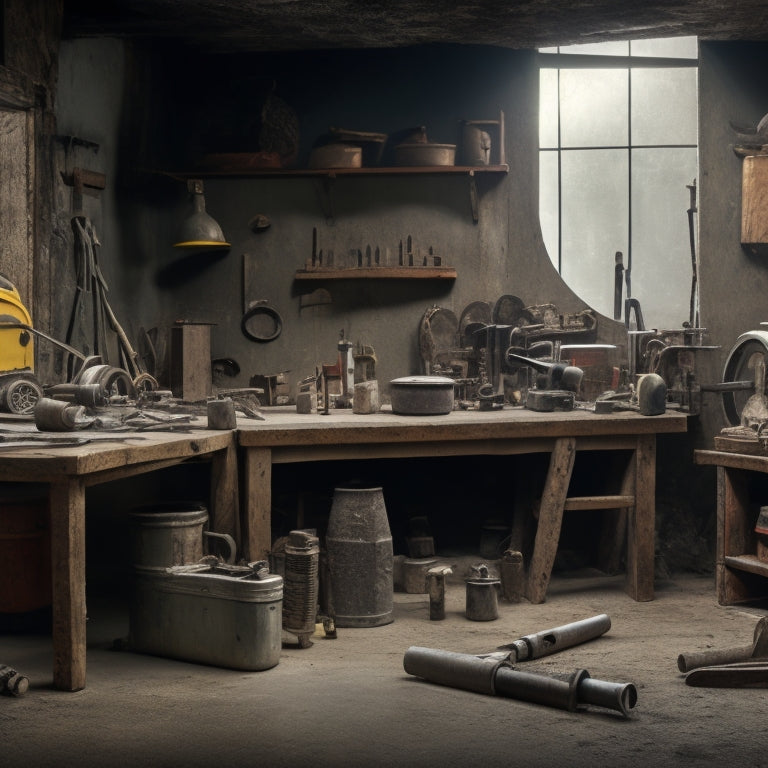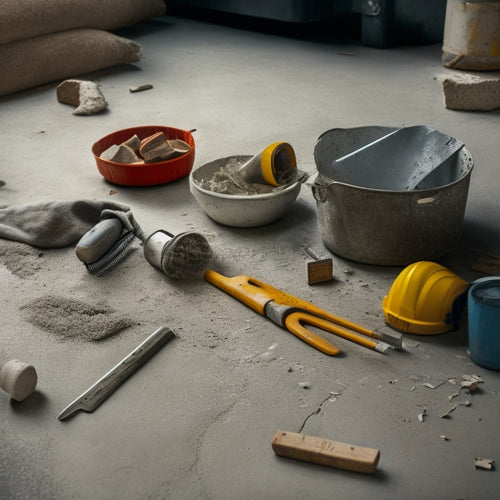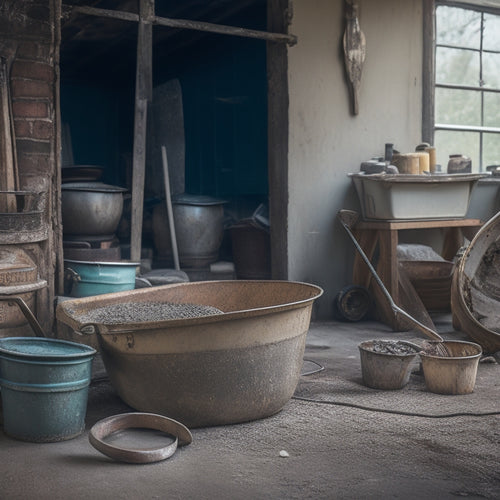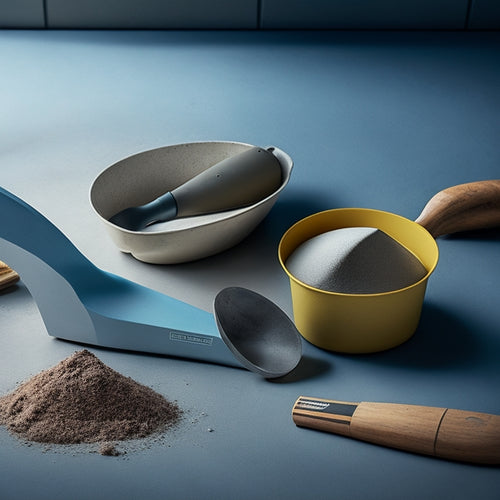
5 Best Tools for DIY Concrete Construction Cost
Share
When taking on a DIY concrete construction project, you'll need to invest in the right tools to guarantee accuracy, efficiency, and safety. A high-quality tape measure and chalk line tool are essential for measuring and marking your concrete surfaces. You'll also need a reliable concrete mixer, formwork and molds, and finishing tools like trowels and edgers. Don't forget safety gear, including protective eyewear, gloves, and breathing masks. With these tools, you'll be well-equipped to tackle your project and avoid costly mistakes. By understanding the must-haves for each stage of the process, you'll be better prepared to take on your DIY concrete construction project successfully.
Key Takeaways
• Invest in a high-quality tape measure to ensure accurate measurements of slabs, walls, and foundations, costing around $20-$50.
• A chalk line tool is essential for creating straight, accurate lines on concrete surfaces, priced between $10-$30.
• A concrete mixer is vital for achieving desired consistency and strength, with prices ranging from $100-$1,500 depending on type and size.
• A set of trowels in various sizes and shapes is necessary for applying and smoothing concrete, costing around $50-$100.
• Prioritize safety gear, including protective eyewear, gloves, and breathing masks, with costs totaling around $50-$100.
Essential Measuring and Marking Tools
When working with concrete, accurately measuring and marking your materials is essential, and you'll need the right tools to guarantee precise calculations and layouts. A high-quality tape measure is important for taking accurate measurements of your concrete slabs, walls, or foundations.
Look for a tape measure with a sturdy hook, clear markings, and a rust-resistant blade. This will make certain that your measurements are reliable and consistent.
In addition to a tape measure, a chalk line is another significant tool for marking your concrete materials. A chalk line allows you to create straight, accurate lines on your concrete surface, which is especially important when laying out footings, walls, or slabs.
To use a chalk line, simply stretch it between two points, snap it to create a line, and then use a trowel or other tool to mark the concrete.
Mixing and Pouring Concrete Equipment
You'll need to mix and pour concrete efficiently to achieve the desired consistency and strength, requiring a set of specialized tools and equipment. Concrete mixers are an essential part of this process, and you'll need to choose the right one for your project. There are different types of mixers, including drum mixers, pan mixers, and tow-behind mixers, each with its own advantages and disadvantages.
Here's a comparison of some popular concrete mixers:
| Mixer Type | Capacity | Price Range |
|---|---|---|
| Drum Mixer | 1-4 cu. ft. | $100-$500 |
| Pan Mixer | 1-2 cu. ft. | $50-$200 |
| Tow-Behind Mixer | 5-10 cu. ft. | $500-$1,500 |
| Electric Mixer | 1-2 cu. ft. | $200-$800 |
| Gas Mixer | 2-5 cu. ft. | $300-$1,200 |
When it comes to pouring techniques, you'll need to take into account the type of pour, such as a slab pour or a wall pour, and the equipment required, such as a concrete pump or a bucket and crane. By choosing the right mixer and pouring technique, you'll be able to achieve a smooth, consistent finish and guarantee the structural integrity of your concrete construction project.
Formwork and Molding Essentials
Formwork and molding essentials, including forms, molds, and release agents, play a crucial role in shaping and holding concrete in place until it sets, allowing you to achieve the desired shape and finish. These tools help you create the desired form and texture, ensuring a professional-looking outcome.
When it comes to formwork, you'll need to choose the right type for your project. You can opt for traditional wood forms, aluminum forms for curved surfaces, or even reusable plastic forms for complex shapes. Each type has its advantages and disadvantages, so it's important to select the one that suits your project's requirements.
Some common formwork and molding techniques include:
-
Building forms with plywood or oriented strand board (OSB) for a smooth finish
-
Using metal or plastic molds for intricate designs and patterns
-
Applying release agents to prevent the concrete from sticking to the formwork
Finishing and Smoothing Tools Needed
Once you've removed the formwork, you're left with a concrete surface that needs refining, and that's where finishing and smoothing tools come into play. Now it's time to focus on achieving the desired texture and appearance.
To start, you'll need a range of trowels in different sizes and shapes to apply and smooth out the concrete. Developing effective trowel techniques will help you achieve a uniform finish.
Next, you'll need to address any imperfections or blemishes on the surface. For this, you'll require a set of edgers, floats, and scrapers. These tools will allow you to remove excess concrete, fill gaps, and create a smooth, even surface.
Safety Gear for Concrete Work
Your concrete construction project demands a high level of personal protective equipment to safeguard you against the hazardous nature of concrete and its ingredients. Concrete dust, alkaline substances, and heavy materials can cause serious injuries if you're not properly equipped. It's vital to prioritize your safety above all else.
Here are some essential safety gear you shouldn't compromise on:
-
Protective eyewear: Concrete dust and debris can cause eye injuries, so wear goggles or safety glasses with a good seal around the eyes.
-
Heavy duty gloves: Concrete can be abrasive, and heavy materials can crush your hands. Wear gloves that provide grip, flexibility, and protection.
-
Breathing mask or respirator: Inhaling concrete dust can lead to respiratory problems. A breathing mask or respirator will filter out harmful particles.
Frequently Asked Questions
How Do I Calculate the Correct Concrete Quantity for My Project?
You'll calculate the correct concrete quantity by determining the concrete volume of your project, considering material waste (usually 10-15%), and factoring in unexpected losses to guarantee you have enough concrete to complete your project successfully.
What Is the Ideal Temperature for Pouring Concrete Outdoors?
As you step into the outdoor pouring arena, remember that ideal concrete temperature guidelines dictate between 50°F and 90°F for successful pours, ensuring proper curing and strength development, so plan accordingly with these outdoor pouring tips.
Can I Use Regular Gloves Instead of Specialized Concrete Gloves?
When working with concrete, you shouldn't use regular gloves, as they'll compromise grip strength and increase safety risks. Concrete's abrasive nature demands specialized gloves for ideal protection, ensuring a secure grip and minimizing the risk of hand injuries.
How Long Should I Wait Before Removing Formwork and Molds?
When building a backyard patio, you waited 24 hours for the concrete to set, just like the contractor did in that YouTube tutorial. Now, you're wondering when to remove the formwork and molds.
Are There Any Eco-Friendly Alternatives to Traditional Concrete?
You're considering eco-friendly alternatives to traditional concrete, and rightly so. Look into sustainable materials like hempcrete, recycled aggregate, and bamboo-infused concrete, which offer green alternatives for your DIY project, reducing environmental impact without compromising strength.
Conclusion
You've made it through the list of essential tools for DIY concrete construction on a budget. Congratulations, you're now ready to commence a project that will leave you covered in dust, exhausted, and possibly questioning your life choices.
But hey, at least you'll have a beautiful concrete structure to show for it. With these tools, you'll be well-equipped to tackle the chaos that's concrete construction.
Just remember, it's all worth it in the end... or so you'll tell yourself.
Related Posts
-

Top 10 Concrete Repair Tools for Small Fixes
You'll need the right tools to tackle small concrete repairs efficiently and effectively. When it comes to small fixe...
-

Top Tools for Mixing Concrete at Home
When mixing concrete at home, you'll need a range of tools to guarantee a successful operation. Start with essential ...
-

Ergonomic Concrete Tools for Tight Spaces
When you're tackling concrete work in tight spaces, ergonomic tools are your best bet for comfort and efficiency. The...


